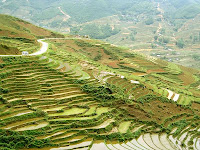 Sa Pa is a quiet mountain town and home to a great diversity of ethnic minority peoples. The total population of 36,000 consists mostly of minority groups. Approximately 7,000 live in Sapa, others are scattered in small communes throughout the district. Most of the ethnic minority people work their land on sloping terraces since the vast majority of the land is mountainous. Their staple foods are rice and corn. The unique climate in Sapa has a major influence on the ethnic minorities who live in the area.
Sa Pa is a quiet mountain town and home to a great diversity of ethnic minority peoples. The total population of 36,000 consists mostly of minority groups. Approximately 7,000 live in Sapa, others are scattered in small communes throughout the district. Most of the ethnic minority people work their land on sloping terraces since the vast majority of the land is mountainous. Their staple foods are rice and corn. The unique climate in Sapa has a major influence on the ethnic minorities who live in the area.The scenery of the Sa Pa region in large part reflects the relationship between the minority people and nature. This is seen especially in the paddy fields carpeting the rolling lower slopes of the Hoang Lien Mountains. On a clear day, the impressive peak of Fan Si Pan is visible. The last major peak in the Himalayan chain, Fan Si Pan offers a real challenge to even the keenest walker, the opportunity of staggering views, and a rare glimpse of some of the last remaining primary rain forest in Vietnam.

 Geology, climate and human activity have combined to produce a range of very distinct habitats around Sa Pa. Especially important is Sa Pa’s geographic position, at the convergence of the worlds 14 “biomes” i.e., distinct biographic areas, producing an assemblage of plant and animal species unique in the world. The Hoang Lien Mountains are home to a rich variety of plants, birds, mammals, amphibians, reptiles and insects, many only found in northwestern Vietnam. For this reason, the Hoang Lien Nature Reserve was designated in 1986, covering much of the mountain range to the immediate south of Sa Pa.
Geology, climate and human activity have combined to produce a range of very distinct habitats around Sa Pa. Especially important is Sa Pa’s geographic position, at the convergence of the worlds 14 “biomes” i.e., distinct biographic areas, producing an assemblage of plant and animal species unique in the world. The Hoang Lien Mountains are home to a rich variety of plants, birds, mammals, amphibians, reptiles and insects, many only found in northwestern Vietnam. For this reason, the Hoang Lien Nature Reserve was designated in 1986, covering much of the mountain range to the immediate south of Sa Pa.The climate of Hoang Lien Nature Reserve is unique to Vietnam. Mean annual temperature for Sa Pa town is 15.4°C, with a maximum of 29.4°C and a minimum of 1°C. The warmest months are July and August, and the coldest months are December and January. Snow falls in some years on the highest peaks. The rainy season is from May to September, with the heaviest rainfall in July and August. Mean annual rainfall is 2,763 mm, with a high of 4,023mm and a low of 2,064mm. Humidity ranges from 75 to 91 percent with a yearly mean of 86 percent.
From Hanoi it is a 9-hour train journey to Sapa. Vietnam Rail operates some of the cars, but other cars in the train are operated by private companies. Some of these cars are nicer than the standard cars. You may need to arrange with a travel agency to get tickets on these tourist cars, but any traveller can purchase tickets for the at the Hanoi train station.







No comments:
Post a Comment